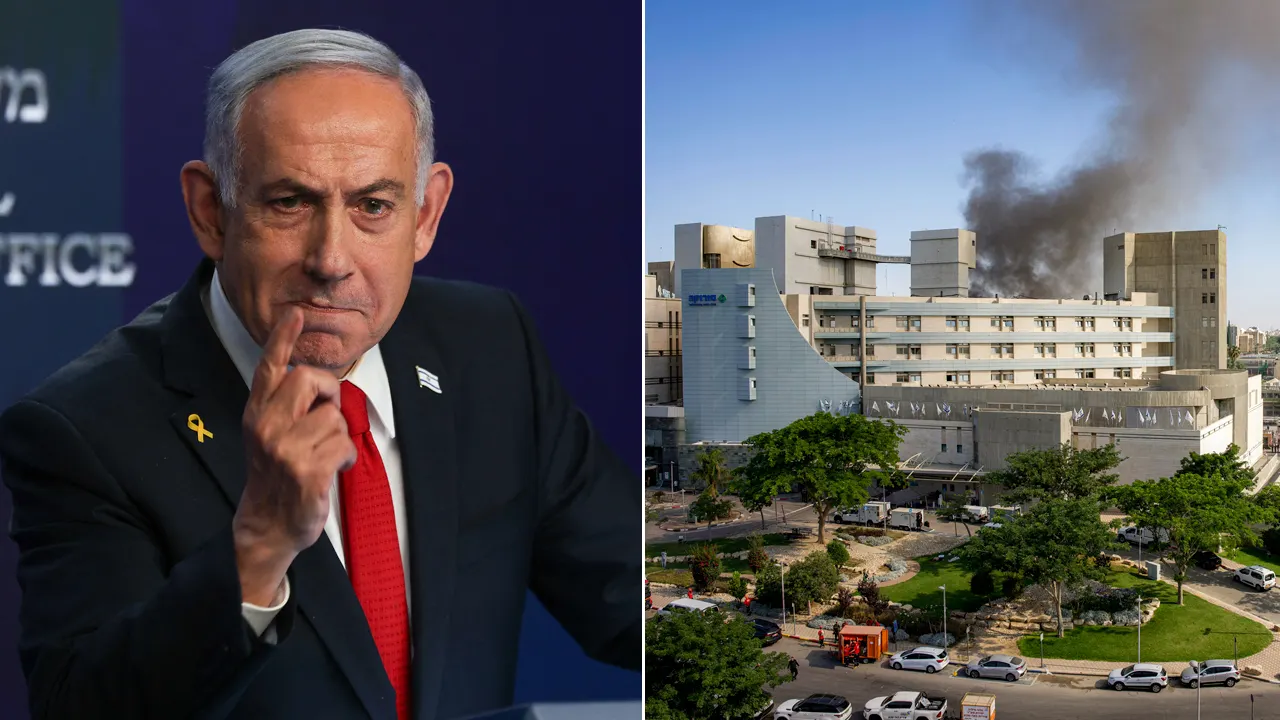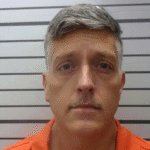BBC Africa Eye
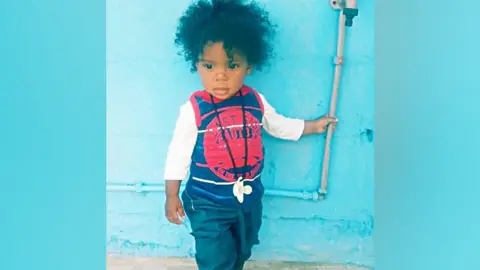 Family Africa
Family AfricaThe father of anxious lies on the narrower, single and points on two small bullet holes in the wall of his house.
This is the Stark proof of the moment he forever broke his family’s life.
The four-year-old son Devon Africa Davin was shot in February, caught in crossweaving of cracking between criminals.
He was a victim of gangs of warfare, which tortured flat flats, the city around Cape Town – heritage apartheid, when not a white population was forcibly moved from the center of the rich city to the Podrina-rich city center.
“This is a bullet hole here,” he says. “He slept here.”
The family was already withstanding the unspeakable horror.
Davin’s older sister, Kelly Amber, was killed for two years earlier, she also shot like rivals fired on each other. She was 12 years old.
Now Devon and his wife, Undejani, was they just their youngest daughter left.
“He asks me,” Where’s my brother? “” He says he had entered. “So I told her that she was with Jesus in Tatin’s heart and in my heart.”
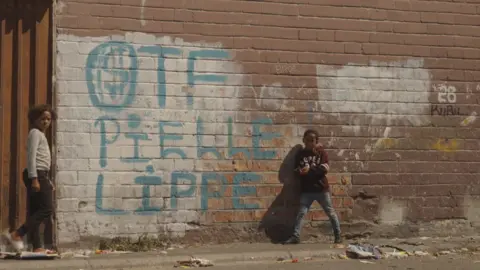
These murders took place in the area known as Vesbank, but many other families across the wider war had to withstand similar nightmares, despite assuring by the police increased patrols.
Numbers tell a terrifying story. The province of western cashi – in which the flat inhabitants seated – consistently see a huge majority of bang-related murders in South Africa, in accordance with the police.
Officially, this is a government’s police priority. President Ciril Ramaphosa set a special unit to fight violence of the gangs in 2018. years, at the end of the year briefly schedule an army to the area, but the problem continued, and the problem continued and the problem was continued and the problem was continued.
“There is a whole history and generation of people born in these gangs,” says Gareth Nevham, head of justice prevention and violence program at the Institute of Security Studies in Johannesburg.
“[They] They bloom in areas that has largely neglected or underdeveloped the state. Gangs provide a form of social structure that actually provides services to communities that the state does not work. They provide food for houses. Money for electricity. Money for transport or funeral. These gangs even pay for school fees. “
They are built into the community and “That is why it is so hard that the police are engaged … it means that they can use houses non-gang members to keep drugs and warehouse weapons.”
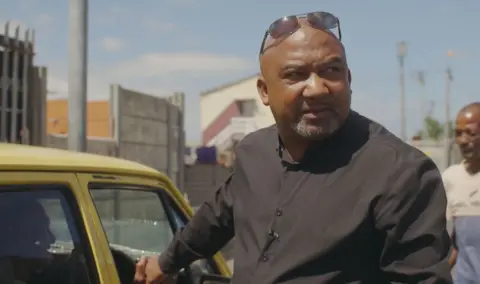
But there are people trying to deal with a problem.
Fifteen kilometers (nine miles) far from Vesbank is Hanover Park in which Pastor Craven Engel was glued to her cell phone almost all day, every day in his quest for peace.
His mission is to mediate in a conflict of gang to stop this violence and murders, encouraged by the lucrative drug trade. He and his team are trying to follow the basic formula: revealing, breaking and changing the mind.
“Hanover Park has no impairment about the economy about it,” says Pastor Engel. “Most of the economy comes out of drug culture. It is the biggest economy.”
Pastor Engel says that the influence of apartheid cannot be ignored, but no generational trauma can manifest as drug addiction, and then briefly.
“The substance [drug] It creates unemployment, the substance creates a robbery, creates a gang fight due to lawns. So, the substance is seated in the middle of such a community in the community, “says Pastor Engel, who estimates that about 70% of local children live with some kind of addiction.
This community of about 50,000 people must withstand shootings and stitches almost every day. And are often young people who work murder and killed.
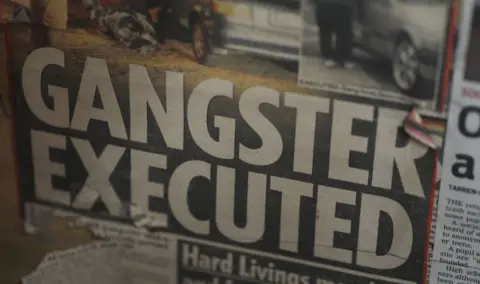
“Only a police approach is unlikely to solve people, because they have a full different series of problems. And it creates a full different series of problems. And it creates a full different set of problems. And it creates a different set of problems. And it creates in the whole different set of problems.
“How is the child shooting seven times in his head or three times in his back? How did the bullet streak the child?” Pastor Engela asks.
On his phone, he calls the leaders of the community and gang Kingpins, constantly caaining to try to give up violence. When he visits him around the BBC Africa, he tries to mediate the truce between the two warranted gangs – and manages to reach a closed leader of one of them.
“If I want something to happen, then it’s still happening. Do you understand the pastor?” The gang chief shouts down the line. “But I can tell you one thing. I’m a guy who likes to oppose if I come under the fire.”
Threats. Even with behind bars.
But Pastor Engel is relentless. In its community it is very visible, whether it is in a house in a potterior or before its great and loud community in the preacher’s week.
“I think what is very very, very terrible there are now more children involved in gangs, because gangs recruited between eight and 15 years,” he says.
The program that works is used to obtain money from the government, but it dried. To end the water supply and protect innocents, it will meet the victims and perpetrators anywhere and at any time.
It also sends rehabilitated gang members to negotiate directly with infected fractions. Those who lived life at the edge of death know how critical it is to be asked to move for peace instead.
Glenn Hans is one such person. He meets with rival gangs to convince them to respect the truce. “I was also in this game. As long as you make a decision you want to be a better person. That’s all,” he says a group of gang members.
One Has A Chilling Response: “The more We Kill, The More Ground We Have, The More We Can Build. So, For Me To Speak About Peace – I Cannot Make That Decision Because It’s Not My Decision to Ensure Peace.”
The display of fire, which eventually arranged only a few days, was broken by the murder of two people in shot in operation.
But some of the conflict thickness had enough.
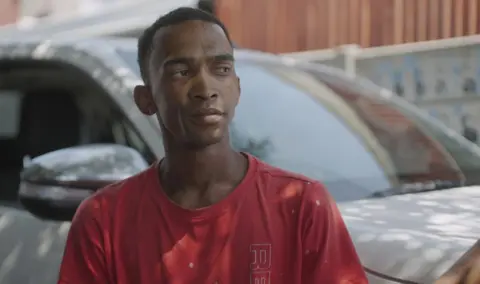
Fernando – or Nando – Johnston is in a gang called Mongrels and wants to try to find a way out with the help of Pastor Engel.
The pastor is Mr. Johnston describes the young and “Born in Gang”, because his whole family was involved.
“There are only two options in this match – or go to jail or die,” says Mr. Johnston.
“I really want to change direction and believe that there is always a way. That is the reason I approached the pastor – to ask if there is a plan or way to take me.”
He joined a rehabilitation program of six to 12 weeks leading pastor and funded charities designed to get people from drugs and work.
“The thing is that you can build again,” Pastor Engel says. “You will be able to get your job yourself and make yourself for yourself. Then you won’t have to tuck you and more …
“I’m ready to go, Pastor,” says Mr. Johnston, ready to leave his trial and scar community looking for a new path.
Those who closest to gathered him well. His mother, Angela April, retains tears, desperately, this time, her son will choose her life. “Please just make the most of this opportunity, Nando,” she says.
“Yes, Mom, I’m always doing the best.”
But it was never easy.
“Fernand’s father was a gangster, but my other children’s father was Mr.,” says Mr. Johnstone’s mother.
“But because it was a gangster, the children also turned on in gangsterism despite them constantly warning them. It was not easy to raise four guys, you know. I always encourage him to change him.”
And so good for Mr. Johnstone. Two weeks from the start of the program, it’s still there.
“Nando stabilizes. He is in the worker program. He is busy to see his family yesterday. We sent him to break himself and returned and tested and tested and tested in his system and tested and tested.
I hope this is a rare commodity, but sometimes spring through cracks on the streets that saw so many traumas.
Not all the streets. Very little hope was found in Devon Africa and a recessed Koopman’s house, sitting in the middle of the battlefield.
The killing cycle and retaliation that hit areas that struggled on the very edges of this beautiful South Africa survived for many of those who only fight to survive.
And they caught in the middle often have to bring an impossible choice.
“Community members, even if they oppose gangs, are not necessarily prolimination for two reasons,” says Mr. Nevham.
“One thing they just don’t know that the police actually come if they call. And if they call the police, they have no idea whether the police are corrupt. People do not understand the scope of challenges in South Africa.”
Obsentiments reflected by peacekeepers on fronts in this war. “No one will come to help or save us or save us. Not from our local government. Nobody will come with a magical wand to heal Cape Stars,” says Pastor Engel.
“As individuals we need to be so determined to build resilience, we create hope for our people and grow. Because policy is obviously failed us.”
More than BBC Africa Eye:
 Getty Images / BBC
Getty Images / BBC